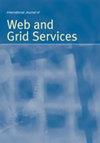An adaptive enhanced differential evolution strategies for topology robustness in internet of things
IF 1
4区 计算机科学
Q4 COMPUTER SCIENCE, INFORMATION SYSTEMS
International Journal of Web and Grid Services
Pub Date : 2022-01-01
DOI:10.1504/ijwgs.2021.10040852
引用次数: 7
Abstract
In this paper, two algorithms enhanced differential evolution (EDE) and adaptive EDE (AEDE) are proposed. The proposed algorithms improve the robustness of the IoT network without changing the degree distribution of nodes. The EDE algorithm maintains the diversity in a solution space through the tri-vector mutation operation and explores the hidden areas. The crossover phase makes the algorithm’s convergence fast towards the global optima. The AEDE dynamically changes the probabilities of multiple operations of the EDE with the changing environment. Also, it maintains the balance between the diversity of solution space and the convergence speed through Copyright © 2022 Inderscience Enterprises Ltd. 2 T.N. Qureshi et al. adaptive probabilities. The EDE performs 7.13%, 31.6% and 41.8% better as compared to GA, SA and HA, respectively. The AEDE outperforms the GA, SA and HA with 11%, 35.3% and 45.4% better efficiency, respectively. The proposed algorithms outperform existing algorithms in terms of robustness and convergence speed.物联网拓扑鲁棒性的自适应增强差分进化策略
本文提出了增强差分进化算法和自适应差分进化算法。提出的算法在不改变节点度分布的情况下提高了物联网网络的鲁棒性。EDE算法通过三向量突变运算保持解空间的多样性,并探索隐藏区域。交叉阶段使得算法快速收敛到全局最优点。随着环境的变化,自动EDE动态地改变EDE的多个操作的概率。此外,它通过版权©2022 Inderscience Enterprises Ltd. 2 T.N. Qureshi等自适应概率来维持解空间多样性与收敛速度之间的平衡。与GA、SA和HA相比,EDE的性能分别提高了7.13%、31.6%和41.8%。AEDE的效率分别比GA、SA和HA高11%、35.3%和45.4%。该算法在鲁棒性和收敛速度方面优于现有算法。
本文章由计算机程序翻译,如有差异,请以英文原文为准。
求助全文
约1分钟内获得全文
求助全文
来源期刊

International Journal of Web and Grid Services
COMPUTER SCIENCE, INFORMATION SYSTEMS-COMPUTER SCIENCE, SOFTWARE ENGINEERING
CiteScore
2.40
自引率
20.00%
发文量
24
审稿时长
12 months
期刊介绍:
Web services are providing declarative interfaces to services offered by systems on the Internet, including messaging protocols, standard interfaces, directory services, as well as security layers, for efficient/effective business application integration. Grid computing has emerged as a global platform to support organisations for coordinated sharing of distributed data, applications, and processes. It has also started to leverage web services to define standard interfaces for business services. IJWGS addresses web and grid service technology, emphasising issues of architecture, implementation, and standardisation.
 求助内容:
求助内容: 应助结果提醒方式:
应助结果提醒方式:


